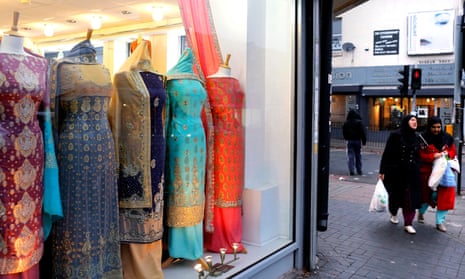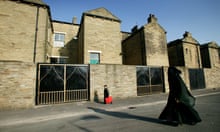It’s Friday – Jumah – the busiest day for mosques and the shutters come up on the haberdashery shops lining Stratford Road in the Sparkhill area of Birmingham, their windows filled with fabrics of deeply vibrant colours.
Families and young people dip into the street’s many takeaways and restaurants to avoid the damp, cold weather and to warm up with a spicy traditional Asian meal.
Among them is Parveen Akhtar, out enjoying a celebratory dinner with her sister. Akhtar is a 38-year-old mother-of-three who has just been given a permanent position as a Birmingham city council social worker. Born in the UK and a practising Muslim, she argues that there is a lack of equality for all women, not just Muslim women, and questions the timing of Dame Louise Casey’s report on community cohesion, as well as its substance. “These studies are not a true representation of what is actually happening in society,” she says. “They come here [to Birmingham], go to the worst areas and then tell their bosses they have seen a trend and write a report which gets into the papers and creates even more hostility for us.
“What reports like this don’t take into account is our culture – most Muslim women want to be at home with their children. Nobody is making them do this, this is what they want. Many are also carers for elderly relatives as we do not put them in homes.
“If a white woman, or even somebody like me who is Muslim but relatively westernised, said we want to stay at home with our kids it would be fine. We would be doing the best for our children. Yet when a woman who has poor English says it then she is all of a sudden trying not to integrate and she is doing something wrong.”
Akhtar says she is “sick of being told I’m not getting on with people who are not like me” and admits to deliberately going out of her way to change that perception. “You know what I’ve been doing recently?” she asks. “When I’m in a shopping centre, if a see a white person sat on a bench I go and sit next to them and talk to them. I try and engage them. It’s funny really: they must think I’m mad. But we are integrating – maybe not to the level that the government wants, but we get on with each other.”
Before compiling her report, Casey twice visited the headquarters of Muslim Women’s Network UK – a charity chaired by Shaista Gohir OBE, which offers specialised help and support to women on issues from domestic violence and mental health to abortion.
At her home in Yardley Wood, Birmingham, Gohir – a full-time mother-of-three who is also a physics and chemistry graduate – says Casey’s report has come out at a time when race relations are brittle but she would rather it were published than buried for fear of causing upset. “She is not really saying anything new. We agree that people not mixing with each other can lead to prejudice and intolerance but this is a two-way street. It is not just Muslims who are not integrating that well – there are pockets in every ethnicity: Sikhs, Hindus, Jews.”
The charity’s executive director, Faeeza Vaid, adds: “What this report does not take into account is the national migration patterns. When people move to this country they want to feel comfortable, have access to food which is familiar to them and be near family. So inevitably they end up living near people who are similar to them.
“This was the first generation though. The second and third generations are far more integrated. They go to university, get an education, move away.”
Both women are passionate about their communities and defend them against the charge that English language skills “continue to be a barrier for some”, according to the report. “There [is] a generation of women who do not speak English but it is because they are incredibly family-orientated and they are bringing up the next generation of doctors, lawyers, dentists. It would be interesting to see if the mothers of Baroness Syeedi Warsi, Naz Shah MP and Mayor Sadiq Khan spoke English,” says Vaid.
Gohir directs us towards a Pakistani community worker, Snouber Sharif. The 42-year-old mother-of-three runs a weekly empowerment session for women from all ethnicities in the predominantly Pakistani Alum Rock area of Birmingham. Her morning has been busy – she has handed out dozens of food parcels and we arrive as she is packing up the leftovers at another project – a weekly community food project in St Peter’s college.
Sharif wears a baby-pink jersey with the name of her community group – Women Empowering Women – emblazoned across the back, over her traditional Pakistani dress. She paid off her mortgage after tapping into the online shopping market and now runs the group full-time after she experienced what she describes as a void in her life.
“It is not up to anybody else to empower you, to get you to do things, achieve: that is up to yourself,” she said. “A lot of it with these women is laziness. I don’t agree that they are segregated and that makes them some sort of victim. They need to get out there and find a job.”
As Sharif finishes making her point, a Pakistani woman walks into the hall. Sharif barks at her, pointing at the woman: “Here you go, here’s an example for you. Why don’t you work?”
The woman replies. “I am a carer for three people: my child, my elderly mother and another elderly relative,” she says. “That should be enough shouldn’t it?”








